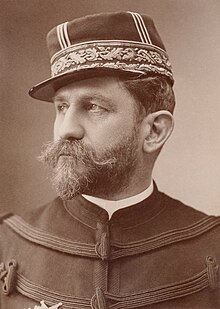Boulangism
The Boulangism was a political movement , which from 1888 to 1890 in France to the General Georges Ernest Boulanger collected. His followers called themselves boulangists.

history
In 1886 Georges Boulanger, whom his officers called "General Revanche", was appointed Minister of War . He made a name for himself, among other things, by modernizing the army . In 1887, Boulanger used the Schnäbele affair to emphasize his advertisement for a border revision. He was dismissed from office by the Republican government, which classified him as a security risk. A populist movement then gathered around him . After Boulanger had announced his resignation as party leader on May 15, 1890, most of his former supporters united under the leadership of Laguerre, Laisant and other a "Republican-socialist- revisionist alliance," in the May 4, 1890 Paris founded has been. Boulangism, with its populism, was seen as a pioneer of the New Right in France.
program
The program consisted mainly of a revision of the constitution with the abolition of the presidency and a unicameral system. The executive branch should be legitimized plebiscitarily. He held out the prospect of revenge against Germany for his supporters.
Mainly the person of the general himself was part of the program. In the Bonapartist tradition, he was celebrated as the savior of the nation. In addition to the use of mass media, the personality cult was based on the sale of biographies, pictures and Boulanger figures.
pendant
In addition to traditional monarchists such as the Duchess of Uzès Bonapartists , political Catholics such as Albert de Mun , nationalist revanchists such as Paul Déroulède , radical republicans and socialists were among his supporters . The latter hoped for social reforms from the general. They all shared the hope of an authoritarian problem solution. Thomas Gräfe sums up:
- The French anti-Semites gathered around people such as War Minister Boulanger and the publicist Edouard Drumont , whose writings were also eagerly read by German anti-Semites.
literature
- Jens Ivo Engels : A Brief History of the Third French Republic 1870-1940. Cologne 2007.
- Jean Garrigues: Le boulangisme. Paris 1992.
- Bertrand Joly, ed .: Dictionnaire biographique et géographique du nationalisme française 1880–1900. In the lemmas: Boulangisme, Ligue des patriots, Mouvements antidreyfusards , Comités antisémites.
notes
- ^ Thomas Graefe: Anti-Semitism in Germany 1815-1918. Reviews, research overview, bibliography. 2nd rev. Edition 2010, BoD Norderstedt 2010, ISBN 9783837001389 , p. 220.